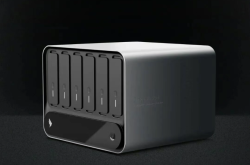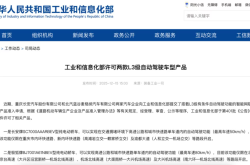European Auto Market: UK Shows Steady Growth in May 2025, Highlighting Chinese Brand Breakthroughs
![]() 06/09 2025
06/09 2025
![]() 435
435

In May 2025, new car registrations in the UK reached 150,000 units, up 1.6% year-on-year, maintaining a moderate but consistent growth trajectory.
Sales of gasoline and diesel models continued to decline, whereas hybrid, plug-in hybrid electric vehicles (PHEV), and battery electric vehicles (BEV) saw robust performances.
Volkswagen retained its top spot in brand rankings, while Chinese brands such as BYD, Jaecoo, and Omoda made significant strides, enhancing their presence in the UK market.
01
UK Market
Sales Overview and Competitive Landscape
In May 2025, the UK market registered 150,070 new cars, marking a 1.6% year-on-year increase. Despite the modest growth rate, this stable performance stood out amidst the general weakness of major European markets. Year-to-date, cumulative sales hit 850,903 units, up 2.8% year-on-year, setting a solid foundation for sustained growth throughout the year.
● By Power Type
◎ Traditional fuel vehicle sales continued to decline: gasoline car sales fell by 12.5% to 71,291 units, and diesel car sales dropped by 15.5% to 7,792 units.
◎ In contrast, new energy vehicle sales surged: BEV sales increased by 25.8% to 32,738 units, accounting for 21.8% of total sales; PHEV sales grew by 50.8% to 17,898 units, representing 11.9% of the market; and non-plug-in hybrid sales rose by 6.8% to 20,351 units.
Collectively, new energy vehicles accounted for nearly 36% of total sales in the UK market, signaling a significant shift in consumer preferences.
● By Purchase Channel
◎ Corporate users emerged as the primary growth driver: fleet purchases increased by 3.7% year-on-year, accounting for 60% of the total market.
◎ Conversely, private car purchases declined by 2.3%, reducing their market share to 37.4%.
◎ Commercial vehicle purchases increased by 14.4% year-on-year, albeit from a relatively small base.
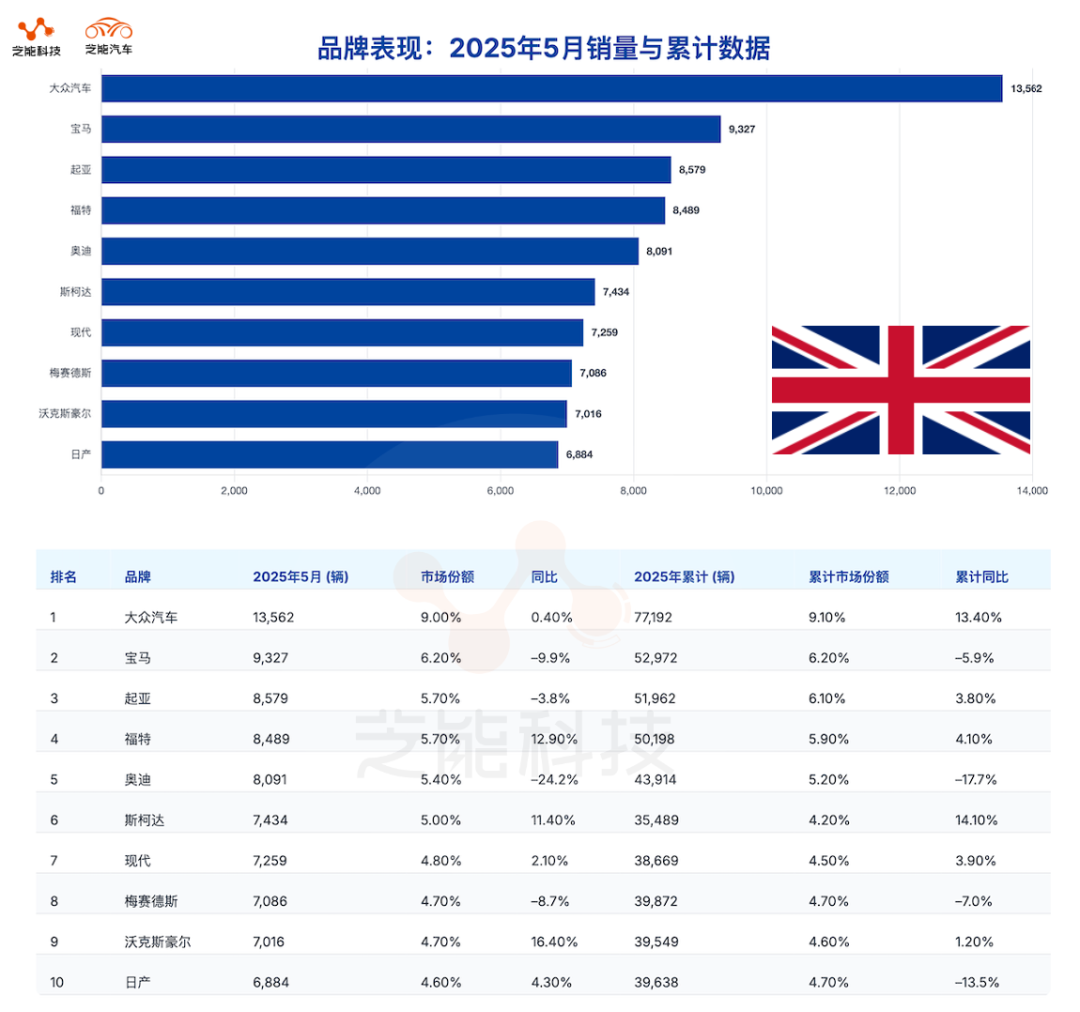
● By Brand
◎ Volkswagen led the pack with 13,562 units, holding a 9% market share and maintaining a substantial lead.
◎ BMW ranked second but experienced a nearly 10% year-on-year decline, with a market share of 6.2%.
◎ Kia took the third spot, recording a slight year-on-year decrease.
◎ Ford performed impressively, with a 12.9% year-on-year increase, securing the fourth position.
◎ Audi faced significant pressure, dropping 24.2% year-on-year to fifth place.
◎ Skoda and Hyundai both reported positive growth, outpacing the overall market rate.
Among the top 10 brands, Vauxhall and Nissan maintained stable market control. Peugeot and Renault rapidly gained ground, with year-on-year growth rates of 36.6% and 37.3%, respectively. Notably, Peugeot returned to prominence with its new 2008 model. Additionally, Cupra achieved over 30% year-on-year growth.
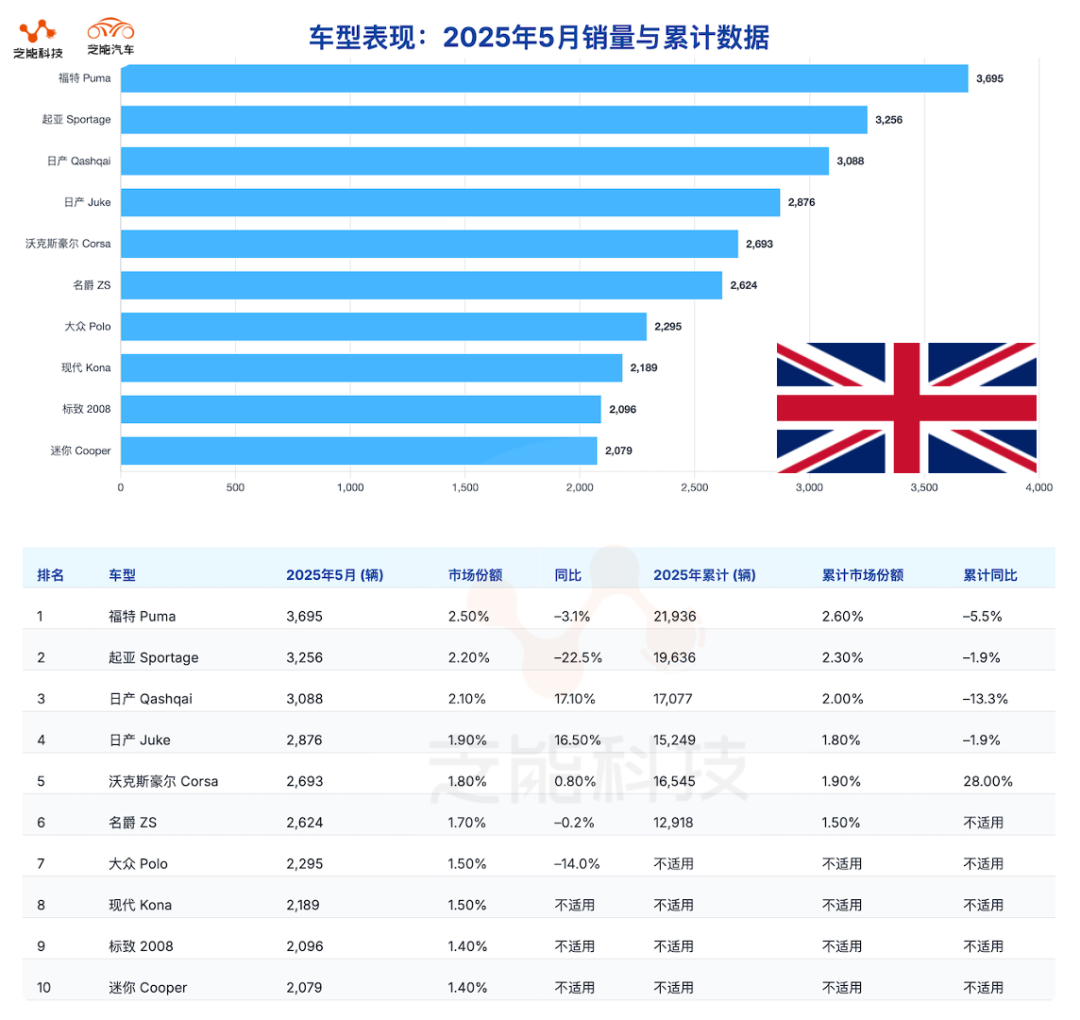
● Model Rankings
◎ Ford Puma retained its top spot.
◎ Kia Sorento and Nissan Qashqai followed in second and third places, respectively.
◎ Nissan Juke jumped to fourth place, achieving its best result in nearly nine months.
◎ Vauxhall Corsa and MG ZS remained steady in the top 10.
◎ Hyundai Kona excelled, ranking eighth and achieving its highest-ever position in the UK market.
◎ Peugeot 2008 also made the top 10, further affirming its popularity in the small SUV segment.
Overall, the UK market's competitive structure remains dominated by German and Japanese-Korean brands, but the increasing penetration of diverse powertrain types has opened up opportunities for new energy vehicles and emerging brands.
02
Chinese Brands
Rising and Challenges in the UK Market
Chinese brands are rapidly emerging in the traditionally competitive UK auto market.
◎ MG sold 6,625 units this month, capturing a 4.4% market share, down 8.3% year-on-year but still ranking 11th. It remains the most prominent "Chinese-background" brand in the UK.
◎ BYD soared to 18th place with sales of 3,025 units, up 407.6% year-on-year, and a 2% market share, firmly establishing itself among mainstream brands. Since the start of the year, BYD's cumulative sales in the UK have reached 14,807 units, up over fivefold year-on-year, demonstrating strong market penetration.
◎ Chinese automakers Jaecoo and Omoda ranked 24th and 26th, respectively, with sales of 1,679 units and 1,492 units this month. Both entered the UK market in their second month, showcasing their ability to achieve stable deliveries and positive market feedback from the outset.
Collectively, these two brands account for nearly 1.5% of the market share, gaining a foothold in the competitive small SUV and crossover segments.
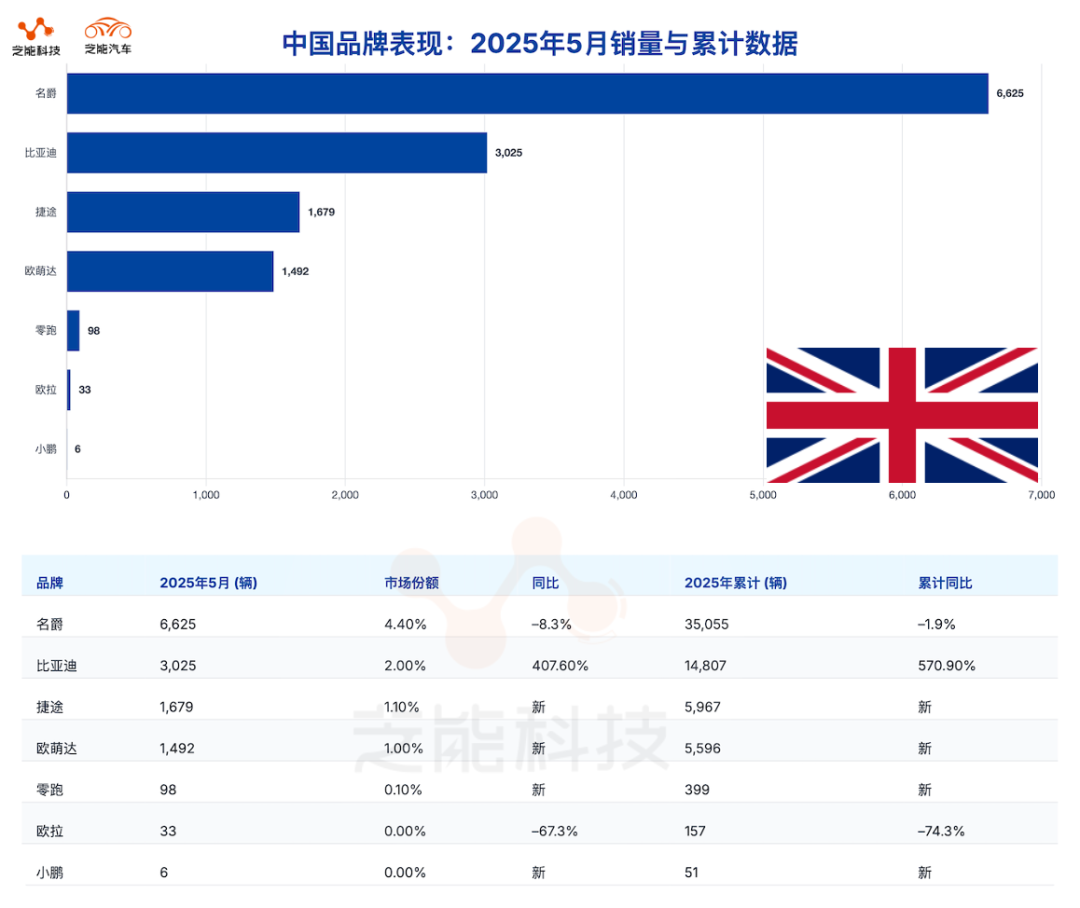
From a competitive standpoint, Chinese brands are concentrating on the new energy segment, particularly in a price-sensitive market with diminishing subsidies. They are penetrating the market with cost-effective pure electric platform models. For instance, BYD's Dolphin and Yuan PLUS are already available in the UK, offering competitive range and specifications for their price points, while Jaecoo and Omoda emphasize the fusion of design and intelligence.
The UK market is highly sensitive to brand recognition, and Chinese brands must urgently establish robust localized operations and after-sales service networks. Additionally, the current high growth rates are built on a low base, and sustained expansion hinges on concurrent improvements in product strength, channels, and brand image.
Tesla's sales declined by 36% year-on-year, indicating weakness among high-end brands in the pure electric market, thereby presenting an opportunity for Chinese brands to make breakthroughs. However, this also underscores the need for Chinese brands to overcome strong brand barriers when entering higher price segments.
Chinese brands are firmly establishing their presence in the UK market, each pursuing a unique development path. BYD exemplifies an electrification strategy focused on product performance and cost-effectiveness, while MG leverages its existing brand heritage to maintain market share. Jaecoo and Omoda, as newcomers, are entering mainstream segments, attracting users with their blend of intelligence and design.
Summary
In May 2025, the UK auto market maintained stable growth amidst structural transformation, with new energy vehicles accelerating their penetration and the share of traditional fuel vehicles continuing to shrink.
At the brand level, German and Japanese-Korean brands still lead the pack, but the market is also embracing a wider range of brands. Notably, Chinese brands' concerted efforts in new energy and intelligent technologies have allowed them to swiftly establish a market foundation.
Brands such as BYD, Jaecoo, and Omoda have successfully transitioned from "0 to 1," and the next challenge lies in achieving sustained expansion from "1 to 10." The performance of the UK market will serve as a crucial indicator for the globalization strategies of Chinese automakers.



